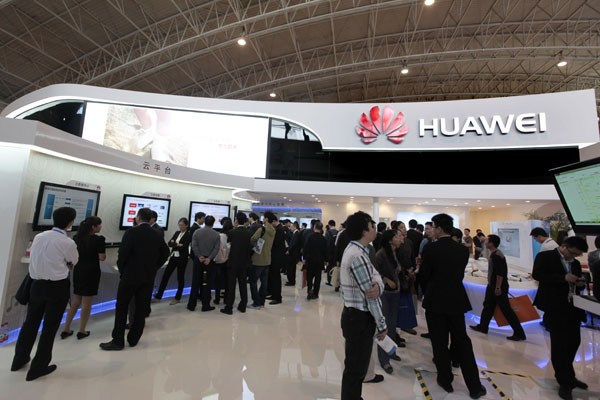Switching tactics in ambitious new move
Updated: 2013-08-09 00:22
By SHEN JINGTING (China Daily)
|
||||||||
Huawei makes bold sales drive with latest network products
Chinese telecoms giant Huawei Technologies Co Ltd showed its ambition to become a leader, rather than a follower, in the network business field for corporate clients it recently entered by introducing a new line of switches on Thursday.
The Shenzhen-based company unveiled the Huawei S12700 series of switch products that introduce software-defined network architecture into campus networks for the first time in the industry. At a Beijing news briefing. Huawei said the S12700 switch will hit the market in September and start large-scale commercial use in November.
 |
|
Huawei Technologies Co Ltd unveiled on Thursday a series of switch products, which the company hopes will add sales momentum to its enterprise network products.Provided to China Daily |
William Xu, chief executive officer of Huawei's Enterprise Business Group, said the new product holds technological advantages over rivals and will add momentum to sales of Huawei's enterprise network products for years to come.
"The S12700 switch shows the industry direction in building campus networks," Xu said. The technology it contains supports diversified trends in business environments, including cloud computing, ‘bring your own device' and big data-related analytics, he added.
Huawei's move directly challenges dominant members of the sector, such as US-based Cisco Systems Inc, in the enterprise network equipment business. "Cisco undoubtedly takes the lion's share in the global switch market but Huawei is quite aggressive and is aiming high to become a leader in future," said Zhao Hailin, an analyst with research firm IHS iSuppli.
Unlike Huawei's traditional business with telecom carriers, where industry standards are set by certain global organizations, the industry standards in the enterprise network gear market are established by those who develop the most advanced products, Zhao added.
"In the past, Huawei acted like a follower because it was a newcomer in the enterprise business. Now, the company has sent a signal that it wants to lead the industry," Zhao said.
Cisco had a 58.8 percent share of the market for switches, which connect computer networks, in the first quarter compared with Huawei's 2 percent, according to data from IDC and Bloomberg.
Huawei officially expanded into the enterprise business and consumer-related smartphone manufacturing in 2011, after the traditional telecom gear market got relatively saturated.
Huawei's enterprise business department has about 20,000 staff now, rising sharply from just a few hundred two years ago. It bought a 49 percent stake in a joint venture with Symantec Corp for $530 million last year, in the hope of bolstering its corporate-security solutions capability.
"Now we have moved into a fast traffic lane," Xu said at the Beijing event. He expects Huawei's enterprise business revenue to increase 40 percent this year to about $2.7 billion. By 2017, the company aims to increase the segment's revenue to more than $10 billion. "We are quite confident about meeting that target," Xu said.
Huawei's network business for corporate clients is still small. In 2012, the business generated $1.9 billion in revenue, up 26 percent from a year earlier and accounting for 5 percent of Huawei's overall group revenue. By contrast, 73 percent of the company's revenue came from its telecom equipment business, while its smartphone business accounted for about 22 percent.
However, Huawei hopes its sales from its enterprise business will account for 15 percent of the total revenue by 2017. Its share of the telecoms equipment business is expected to drop to 60 percent by then, from 73 percent in 2012.
Most Viewed
Editor's Picks

|

|

|

|

|

|
Today's Top News
US realty market 'connects dots' with China buyers
Pharm giant suspected of bribery
Economic prospects improved
Beijing rejects protest over patrol
China Unicom tests 4G network
Switching tactics in ambitious new move
Rare earths on shaky ground
More young adults living with parents
US Weekly

|

|












